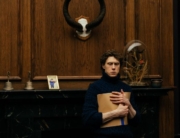The Patience Stone is as specific as it is mythic. Set in an unnamed Middle Eastern country, though a lot like Afghanistan (the exteriors were filmed in Kabul under the ruse of making a folkloric documentary), the unnamed characters could be cautionary figures in a post-apocalyptic Twilight Zone of constant war.
Inside a modest home over the course of several days, a beautiful, unnamed wife (the mesmerizing Iranian actress Golshifteh Farahani) has been devotedly caring for her older, comatose husband (Hamidrez Javdan). She measures his faltering breaths by her prayer beads and follows a mullah’s instructions to pray over the intravenous solution and eye drops she diligently applies, hoping that they will heal the bullet wound to his neck. It’s not just that the time of his expected recovery has passed that’s amping up her anxiety. Their two little daughters are hungry, she’s run out of money for more medication, the sounds of guns are filling the streets outside, and her husband’s family has abandoned them as their neighborhood has turned into the frontline. Militia tanks roll past their gate, and explosions drive her and her children down to the cellar.
At her wits’ end, she begins to do something she has never done before—she freely talks to her husband. As he lies unresponsive, her monologues become more and more honest and revealing. She recalls her abused childhood, her arranged marriage to him in absentia—literally to his photograph and dagger—when he was off fighting jihad, and his domineering mother insisting on purity and grandchildren, though he was home only three out of their ten years together. Surprised at how empowering it is to hear her own voice revealing truths she has never admitted before, she risks the dangers in the street to look for the only relative who has ever been sympathetic to her, her aunt (Hassina Burgan), comfortably ensconced in a brothel.
The aunt not only provides safe childcare, but a cynical, earthy education in manipulating hypocritical, religious men through sex. She encourages the wife to treat the husband like the patience stone in the pan-Middle Eastern legend, a stone to confide in with all one’s problems and secrets until it’s so full it bursts in release. For the first time, the wife shows affection for her now-passive husband with caresses and cuddles, and just when she is on the verge of the most intimate revelations, two turbaned guerrillas charge in. Her aunt has advised her to use a coy trick to avoid rape, to tell would-be attackers she’s a prostitute, and their reactions are telling about men’s frustrations in this fraught environment. The risks she will continue to take make for a very tense film.
By opening up his one-setting novel, Afghani expatriate director Atiq Rahimi takes a theatrically allegorical story into more grounded realism, like Denis Villeneuve’s Incendies (2010). The parallels to the societal dangers from women in the “talking cure” of psychotherapy, as seen in David Cronenberg’sA Dangerous Method, are striking, and Per-Ake Holmquist and Suzanne Khardalian’s documentary Young Freud in Gaza (2008) examined how threatened Arab families can react if homebound women express their feelings during war. I might have thought Stone a propagandist outcry but for such documentaries, including Kim Longinotto’s Salma at Sundance this year, that sadly show the lengths Muslim families may go to prevent women from talking. But even with this cultural specificity, The Patience Stone soberly demonstrates the cruel impact of oppression on women any place, any time.







SO WELL DONE. SO WELL DONE. I SAW IT ONLINE ON YOUTUBE. THESE ARE THE STORIES OF WOMEN’S LIVES. ALSO SEE “MOTHER OF GEORGE” AND “THE VOID”. THIS IS 5STARS OUT OF 5.–MO